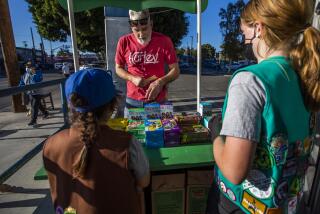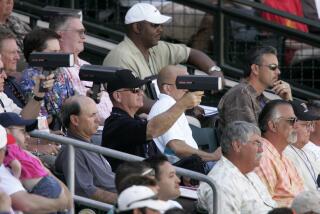Gay’s Suit Over Expulsion From Boy Scouts Begins : Trial: The Eagle Scout was not allowed to become an adult leader after taking a male to his high school prom.
- Share via
Timothy Curran was 17 when the Boy Scouts awarded him its highest honor--the Eagle Scout badge.
On that spring night in 1980, family and friends sat in a Berkeley church proudly listening as he was held up as an exemplary Scout, possessing the character and leadership qualities coveted by Scouts everywhere.
But months later, Curran was summoned to a meeting at the Boy Scouts’ Mount Diablo Council office in Walnut Creek. Executive Director Quentin Alexander told him that he could not continue in scouting because officials had learned he had taken a male date to his senior prom. Curran said Alexander told him that “homosexuality and Boy Scouting are not compatible.”
On Thursday, nearly a decade after Curran filed suit to rejoin the Scouts as an adult leader, his trial began in Los Angeles Superior Court. A defense attorney asked early on if Curran could recall the Boy Scout oath.
The 28-year-old free-lance journalist smiled broadly from the witness stand, lifted his hand in a three-fingered salute and recited: “On my honor, I will do my best to do my duty, to God and my country . . . to keep myself physically strong, mentally awake and morally straight.”
The case, which is the first of its kind involving the 4.3-million-member Boy Scouts of America, could have profound implications for every troop in the U.S. If successful, it would not only be seen as a significant victory for the gay rights movement but could change the way courts apply civil rights laws to private, nonprofit organizations.
Curran’s suit, which was filed in Los Angeles after he moved here to attend college, seeks a permanent injunction preventing the Mount Diablo Council from excluding him from membership and being a troop leader.
The American Civil Liberties Union, which is representing Curran, has argued that by denying him membership the Boy Scouts are violating the “equal public accommodations” section of the state Civil Rights Act, which prohibits arbitrary discrimination.
The Scouts countered that they are a private organization and, under California’s Constitution, can choose their own leaders.
The Scouts’ national leadership has taken the position that “as an organization that stresses the values of the family, we believe that homosexuals do not provide the proper role model for our youth membership,” said Lee Sneath, national spokesman for the Irving, Tex.-based group. “As a private organization, they have a constitutional right to determine the leadership and membership qualifications.”
A key issue in the Curran trial will be whether the Boy Scouts is a business as defined by the state Civil Rights Act.
During opening arguments Thursday before Judge Sally G. Disco, Curran’s attorneys portrayed the Boy Scouts of America as a “massive, national enterprise” with 2,000 retail shops located throughout the country and total revenues of $52.3 million.
Jon Davidson, senior staff counsel for the ACLU Foundation of Southern California, noted that in one year, the Mount Diablo Council alone had revenues of $750,000.
New York City attorney George Davidson, who is defending the Mount Diablo Council, dismissed the argument, saying: “A duck has feathers and lays eggs but it doesn’t necessarily mean it’s a chicken.”
Curran sat behind the counsel table where his three lawyers and three attorneys for the defense were seated. A few feet away sat Quentin Alexander, the Scout official who was waiting to testify about why he had denied his former Eagle Scout further membership in the organization.
Both men have said that scouting molded their character, an issue in the trial.
Alexander, 55, joined the Scouts 43 years ago in Daisy, Tenn., and never left the organization. He worked his way up through the leadership ranks to his present position as head of the 13,000-member Mount Diablo Council, which encompasses Contra Costa County.
One of the most important benefits of scouting, he said, is to teach youth “the difference between right and wrong.”
To this day, he can recall the community service project he undertook at 12. “There was an older widow lady who I helped every day after school,” he said. “I would go to her house and do chores, chop wood, whatever needed to be done. The lady’s name was Mrs. Crowe.”
Curran was 14 when he joined Troop 37 in Berkeley after a friend dragged him to a meeting. His first recollection, he testified Thursday, was of a fellow Scout showing him an aquarium filled with “a snake and a reptile.” He was fascinated and stayed on to become a patrol leader, a member of the Order of the Arrow, a journalist for the Scout newspaper published each year at the National Jamboree camp-out, and an Eagle Scout with more than 20 merit badges.
Less than 3% of all Boy Scouts achieve the rank of Eagle Scout. Curran impressed his supervisors by completing the rigorous program even though he was a relative latecomer to scouting. He finished the required work three days before his 18th birthday, the age at which Scouts “retire” and become adult volunteers.
As part of his Eagle Scout work, he helped organized a troop of deaf children in Oakland.
His problems with Scout officials began when he applied for a second time to write for the Scout newspaper at the National Jamboree. He and his parents met with Alexander.
“He told us that homosexuality and scouting are not compatible,” Curran recalled. Apparently, Scout executives had been shown an Oakland newspaper article about gay youths, which featured Curran, who had taken a male date to his senior prom.
Curran’s mother, Beryl Lange of San Francisco, recalled: “I sat there at the Scout meeting and couldn’t believe they were talking about Tim, that he would lead anyone astray. He was the epitome of what they hoped for in all their Scouts and there they were telling him he was not worthy.
“Taking a male date to the prom had been the most difficult thing he had ever done in his life,” she added, “and I was very proud of him for having the courage.”
The Curran case mirrors the social struggles of both gays and the Boy Scouts in recent years.
A decade ago, many believed the gay rights movement was nearing the crest of acceptance, but that was before the AIDS epidemic struck down thousands. While AIDS spurred anti-gay sentiment, it also galvanized the gay community’s fight for equality and political action.
Robert Bray, a spokesman for the National Gay and Lesbian Task Force, said that the Curran case addresses an item that has been high on homosexual activists’ political agenda--”to strike down the stereotype that gays and lesbians cannot be role models for children.”
“We are frequently denied the right to be coaches, counselors, mentors, parents,” Bray said. “It perpetuates the irrational and loathsome myth that gays recruit and molest children.
“Here is an outstanding Scout who is being denied the opportunity to lead other Scouts because of who he loves and who he is.”
The 80-year-old Boy Scouts of America also has had its share of public relations problems. Since its inception, the group has been viewed by supporters as a movement that builds strong moral character, but in recent years critics have likened the group to “paramilitary goodie-goodies.” Membership dropped to 3.1 million in 1979 from a high of 4.8 million seven years earlier.
“We were a victim of the ‘60s philosophy, no question about it,” said Richard Harrington, director of the 11-state Western Region, which includes all the Scout councils in California. “But there has been a dramatic change. We like to think that people are coming back to values we never left.”
Officials have instituted major program changes. The group, which once taught how to stop runaway horses, now has classes in atomic and computer science. It conducts community programs that seek to eradicate drugs, child abuse, illiteracy, hunger and youth unemployment.
The Boy Scout Handbook, reissued this year, includes a 23-page insert on the dangers of drugs and child abuse and tells how to conduct environmentally sensitive camping trips. A multimillion-dollar advertising campaign is under way which emphasizes river rafting, mountain rappelling and other high-adventure activities. The effort has paid off. Membership is climbing again, with 4.3 million Scouts and 1.1 million adult volunteers now on the rolls.
The ACLU has not been the only group to take the Boy Scouts to court. In 1987, a single mother alleged that she was discriminated against because the Scouts had a policy that only men could serve as leaders. She had won several pretrial skirmishes and the case was set for trial when the Boy Scouts announced they had changed its policy and women could hold leadership posts.
At the time, Scout officials said that the rule was dropped because the court battles had become too expensive.
The organization also is defending itself against a religious freedom suit filed in federal court in Chicago earlier this year. In that case, an agnostic Scout allegedly was denied membership when he refused to take the Scout oath to “do my duty to God.”
In the Curran case, Judge Disco will first have to rule on whether the Boy Scouts is a business. If she finds that it is, then a jury will be called in to hear the rest of the case.
Although he has waited nearly a decade for his trial--the result of court delays, appeals and legal technicalities--Curran said he would still like to be a troop leader.
“I would start tomorrow,” he said. “I learned how valuable the scouting experience can be for kids. It taught me self-respect. I have a lot to offer Scouts as a role model. I am an Eagle Scout, a journalist, a responsible adult.”
More to Read
Sign up for Essential California
The most important California stories and recommendations in your inbox every morning.
You may occasionally receive promotional content from the Los Angeles Times.













